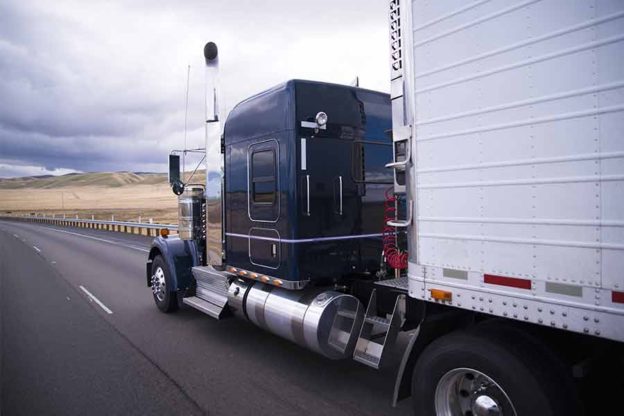The Novel Coronavirus has impacted every industry in unique, unprecedented ways. Some businesses were impacted immediately, especially those without the ability to adapt to curbside services, online orders, or digital procedures. Individuals across hundreds of companies have experienced layoffs or furloughs.
Certain industries – including grocery stores and delivery services – faced sudden, rapid growth, with a swift and urgent need for staff. The transportation industry sits between the growth and decline of hundreds of companies. How has trucking been impacted by the coronavirus pandemic?
While truckers remained busy moving freight to keep hospitals, grocery stores, and Amazon warehouses stocked with essential items, tougher times may be ahead. As state and local governments keep isolation orders in place, economic impacts increase in severity – and truckers will be affected.
In the content below, we explore the future of trucking after the coronavirus pandemic, to the best of our knowledge.
Freight Volumes
The need for freight volume in certain sectors soared with shelter-in-place orders and social distancing guidelines. Shipping and delivery companies, grocery stores, childcare providers, and hospitals have required unprecedented amounts of food, hygiene products, medical supplies, and other essential items. As people’s buying habits suddenly changed to pandemic needs, truck drivers have been required to continue hauling loads across the country.
However, as non-essential businesses closed their doors and hundreds suffered from unparalleled layoff/ furlough rates, the demand for “non-essential” items plummeted exponentially. Thus, while certain sectors soared in freight demands, others dropped to nearly nonexistent requirements.
Overall, freight volumes are starting to decline – a decline predicted to accelerate over the coming weeks. The Trucker’s Report states:
Even where people are still working and still making money, social distancing practices and worries of an economic recession are keeping people from spending money on non-essential items. As demand for those goods falls, so too does freight volume… Some sectors are already feeling the squeeze, but if the outbreak lasts much longer, the strain on the economy and freight volumes will only get worse.
The Trucking Industry’s Response to Plummeting Freight Volumes
Small, independent transportation companies are hit the hardest. As freight volume plummets, some face an uncertain future. One independent driver, Timothy Barret, shared his concern for the future of his business should the freight decline continue. Barret primarily hauled automotive parts for concerts and live events, two industries severely impacted by COVID-19.
“I am basically shut down,” Timothy stated. “I can go broke two ways: hauling for nothing or not hauling. I’m not going to [run loads] and exchange money for fuel and drive the truck for free.”
Although small to mid-size companies may be impacted most severely, even large carriers may have to lay off workers if the decline proceeds on the projected path.
Drop in Oil Prices
Initiated by a Saudi Arabia-Russia feud over oil prices, crude oil prices around the world have dropped – negatively impacting freight rates for independent truckers. At first glance, lower diesel prices may seem beneficial, lowering operating costs. However, lower oil prices will impact already slow freight within the oil sector (accounting for 3-5% of all truck freight).
Jim Meil from ACT Research commented:
The drive for fuel efficiency and the advances in technology are some of the crowning achievements of truck OEMs… It’s great to see trucks get mileage that was unthinkable even 10 years ago with 8.5 mpg and higher in some cases. But that’s a bigger benefit when diesel is $4 or higher rather than $2.75 and lower. Fuel efficiency is one of the advantages the industry uses to put buyers in trucks, and with lower fuel prices, that advantage goes away.
Predicted Economic Recovery Shape
With a predicted, U-shaped economic recovery, getting back to normal freight volumes and freight rates may take a considerable amount of time.
The U-shaped economic recovery describes a unique recession and recovery pattern, defined by a steep decline in employment, GDP, and industrial output that remains depressed from 12-24 months before complete recovery. In a U-shaped recovery, the recession tumbles along the very bottom of the shape before beginning a sharp incline. The 1973-75 Nixon recession and the S&L crisis recession of 1990-91 are two examples of historical U-shaped economic recovery patterns.
Although the predicted recovery shape is only a prediction, the educated projection extends recovery into 2021.
Can Freight Factoring Help?
Todd Amen, CEO and president of American Truck Business Services (ATBS) warned that consumers out of work for an extended period will halt spending. “Ultimately,” Amen commented, “what happens to the sentiment in America is we close our pocketbooks, we’re going to stop spending money because we need to survive. We’re going to stop shopping except for the essentials. That means freight stops moving.”
As owner-operators prepare for darker days, trucking companies can look for financial assistance to remain afloat until the economy recovers. Freight factoring is one such option. In fact, non-recourse freight factoring can provide the cash flow necessary for your trucking company to recover after the coronavirus pandemic and launch into a profitable future.
Advanced Commercial Capital
At Advanced Commercial Capital, we protect trucking companies from unpaid freight invoices due to fraud, bankruptcy, or delinquency. Our non-recourse factoring provides cash flow for your trucking company with zero unpleasant surprises. We own the risk, not you. If your client fails to pay, we take responsibility for the unpaid invoice.
Trucking companies often look to factoring to increase cash flow during periods of growth – or periods of economic difficulty. To get in touch with our team about factoring for your transportation company today, feel free to reach out at 855.465.4655 or via our online contact form!












